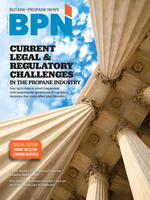
One of the hard truths in marketing is that you can’t effectively sell your value to potential customers unless you understand it yourself. While this might initially sound like “self-help” rhetoric, it’s actually quite practical.
Consumers now have more resources than ever to guide their purchasing decisions. They can explore and evaluate options for a long time before making a purchase. A recent study found that the average customer visits a brand’s website nine to 10 times before buying. This is true for lawn furniture, televisions and, yes, propane providers.
There’s a term for the stage in a potential customer’s journey when they oscillate between researching online and narrowing down their choices — it’s called the “messy middle.”
As we’ll emphasize throughout this series, these customers are searching for an authority they can trust. When it comes to propane and home comfort, this trust becomes especially personal. It’s not just about having a warm, safe home and hot water for showers; it’s about being able to cook meals, dry clothes and have backup power during grid outages. Building a brand strategy that works means identifying why your company is the trusted authority in your market.
Look Deeper to Find Your True Differentiator
When we start working with a new client, I always ask some variation of this question: “What do you say when a potential customer asks why they should choose you over a competitor?”
There are plenty of responses to this question, and successful propane providers usually have an intuitive sense of what makes them stand out. However, putting it into words isn’t always easy.
We often hear responses that people believe are differentiators: “We’ve been in business for 100 years,” “We’re local,” “We’re family-owned,” etc.
But here’s the thing — your competitors might also have a long history, and they could be local and family-owned too. Why should a potential customer care about your history if the company down the street offers a slightly lower price? This is why you need to dig deeper to uncover the unique aspects of your business that truly matter to customers. For example:
- Does being family-owned mean someone in leadership is always available to talk on the phone?
- Does being local mean you are able to send someone to a customer’s home on an icy winter night when they run out of propane?
- Does your long history in the area mean you’ve built strong relationships with suppliers, ensuring a steady fuel supply even when other companies struggle to keep up with demand?
These essential differentiators can reassure a prospect that you offer real value and that they can trust you with their family’s comfort.
What Your Brand Means in the Real World
Your brand is more than just a website, logo or slogan. It doesn’t live solely online or on the side of your delivery trucks. While you, as the business owner, may have ideas about how you want the world to perceive your company, many aspects of your brand identity are shaped by factors beyond your control.
A conversation with a customer service representative, an interaction between a delivery driver and a homeowner, or a customer review on Google can all significantly influence how your company is perceived.
One effective way to pinpoint your brand differentiator is to think about instances when your team has gone above and beyond. Has a customer recently praised a technician for coming through when their furnace broke down? Do you have a loyal homeowner who refuses to do business with anyone else?
One example that leaps to mind for me is a fuel and HVAC client who mentioned in passing that most of their customers left copies of their house keys in the company’s office so that, if necessary, fuel drivers and techs could access the house while they were out of town. Now, that level of trust certainly differentiated them from the competition!
Living Your Brand at Every Level
Digging deep to identify your brand’s unique differentiator also helps you and your marketing partner develop well-targeted campaigns that resonate with prospects looking for a trustworthy home fuel provider.
A successful branding and marketing strategy will highlight the strengths that you and your team embody at every level, including:
- How your staff answers the phone and signs off in emails
- The way your technicians and delivery drivers interact with homeowners
- Every social media interaction
- How you respond to online reviews — both negative and positive — and generate more positive ones
- The way you communicate and follow up with existing customers
- The content and imagery on your website — does it emphasize your differentiators?
- Your company blog — does it address the questions people in your market are asking and demonstrate your team’s knowledge and commitment?
You can extend these touch points to include all direct marketing communications: display ads, direct mail, targeted emails, etc. Do these materials convey the value of doing business with you, not just a promotion or discount?
You can’t effectively sell your business to customers unless you fully understand what makes you special. A dedicated marketing partner with experience in your industry can help you refine and polish your brand, then develop winning campaigns centered around it.
Next time, we’ll discuss proven tactics and strategies that attract the best prospects and encourage them to submit inquiries to your company.


